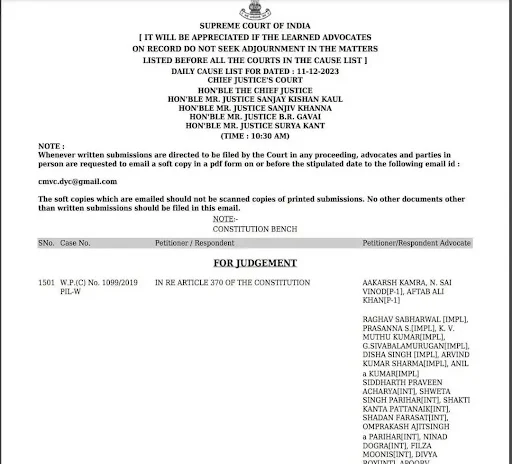Breaking News: Supreme Court To Deliver Judgment In Article 370 Case On December 11
Big Breaking:- The Supreme Court will pronounce its verdict in the case challenging the Union Government’s 2019 decision to repeal the special status of Jammu and Kashmir under Article 370 of the Constitution on December 11.
The Constitution bench of the Supreme Court, led by Chief Justice of India DY Chandrachud and comprising Justices Sanjay Kishan Kaul, Sanjiv Khanna, BR Gavai, and Surya Kant, had reserved the judgement in the matter on 5 September 2023 after hearing it for sixteen long days. It may be recalled that the petitioners in the matter had also challenged the J&K Reorganization Act which bifurcated the State into Union Territories of J&K and Ladakh.
The hearing in the matter, which commenced on August 2, 2023, witnessed extensive arguments and discussions over a span of sixteen days. This landmark case had remained dormant for over three years, with its last listing dating back to March 2020.
The petitioner counsels argued for the first nine days and stressed upon the unique nature of J&K’s relationship with India which got embodied in the Indian constitutional setup, highlighting that the Maharaja of J&K did not give up the internal sovereignty to the Dominion of India. Thus, while the power to make laws relating to foreign affairs, communication, and defence lied with the Union as per the Instrument of Accession (IoA), the internal sovereignty of J&K which provided it with powers to legislate on all other matters remained with the Maharaja. It was argued that Article 370 had assumed permanence and was no longer a ‘temporary’ provision post the dissolution of the J&K Constituent Assembly in 1957. The petitioners further contended that the Indian parliament, under the current constitutional framework, could not convert itself into a Constituent Assembly. They also stressed upon the misuse of Article 356, which imposes President’s Rule in a State. It was emphasised that the purpose of Article 356 was to restore state machinery and not destroy it but the President’s Rule in J&K was imposed to destroy the state legislature. It was added that President’s Rule under Article 356 was in its nature “temporary” and thus permanent actions could not be taken under it. The petitioners also argued that the amendment of Article 370 through Article 367 was invalid. Finally, it was stated that while Article 3 of the Indian Constitution granted the power to Union to alter the boundaries of states and even create smaller states through bifurcation, it had never before been used to convert an entire state into a Union Territory (UT). The negative impact of turning J&K into a UT on the constitutional structure was also underlined. A detailed summary on petitioners arguments can be found here.
Per contra, the Union Government along with other respondents argued that the abrogation of Article 370 resolved the ‘psychological duality’ of the people of J&K and that there existed discrimination against the people of J&K before the abrogation as the Indian constitution was not fully applied to the state prior to 2019. It was underlined that it was very clear that the Constitution makers foresaw Article 370 as a ‘temporary’ provision and wanted it ‘to die’. Challenging the assertion of an exclusive special status for J&K, the respondents argued that during the late 1930s, a multitude of princely states were in the process of drafting their own constitutions. It was also submitted that the execution of a merger agreement was not necessary to become a part of the Indian nation. Further, internal sovereignty could not be confused with sovereignty. It was stated that J&K was only converted to a UT owing to it being a sensitive border state for a temporary time period and that its statehood would be restored. It was also argued that if Article 367 was not modified, it would have the effect on Article 370 becoming a permanent feature of the Indian Constitution, as sans the Constituent Assembly, Article 370 could never be modified. Finally, the respondents asserted that the J&K Constitution was subservient and subordinate to the Indian Constitution and the J&K Constitution never had original constituent powers. Thus, even if the Constituent Assembly had been in existence, it would have a limited role to play in abrogation of Article 370 as its decision would be only “recommendatory” in nature and the President could have taken any decision even if the Constituent Assembly did not agree to the same.
Tags
NEWS

